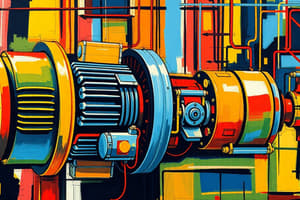Podcast
Questions and Answers
What is the primary goal of control systems in the context of electrical machines?
What is the primary goal of control systems in the context of electrical machines?
- Optimizing overall performance while providing robustness, stability, and safety (correct)
- Reducing the reliance on power electronic technologies
- Maximizing environmental impact
- Enhancing efficiency and speed
Which of the following is NOT mentioned as a type of electrical machine in the text?
Which of the following is NOT mentioned as a type of electrical machine in the text?
- Variable frequency drives (correct)
- Synchronous generators
- Transformers
- Induction motors
What technology enables modern electrical machines to advance in efficiency, speed, and performance?
What technology enables modern electrical machines to advance in efficiency, speed, and performance?
- Power electronic technologies (correct)
- Fuzzy logic control
- Advanced artificial intelligence algorithms
- Proportional integral derivative (PID) controllers
What are the fundamental components of electrical systems that convert mechanical energy into electrical energy or vice versa?
What are the fundamental components of electrical systems that convert mechanical energy into electrical energy or vice versa?
Which advanced artificial intelligence algorithm is NOT specifically mentioned in the text in relation to control strategies for electrical machines?
Which advanced artificial intelligence algorithm is NOT specifically mentioned in the text in relation to control strategies for electrical machines?
What do electrical machines require specialized control strategies for?
What do electrical machines require specialized control strategies for?
What is the primary function of power systems?
What is the primary function of power systems?
What are the primary objectives of power system control methods?
What are the primary objectives of power system control methods?
Which of the following is NOT a primary function of control systems in electrical engineering?
Which of the following is NOT a primary function of control systems in electrical engineering?
What is the role of control systems in electrical engineering?
What is the role of control systems in electrical engineering?
Which of the following is NOT a primary component of power systems?
Which of the following is NOT a primary component of power systems?
What is the relationship between power systems and control systems in electrical engineering?
What is the relationship between power systems and control systems in electrical engineering?
Flashcards are hidden until you start studying
Study Notes
Introduction
Electrical engineering is a broad field that encompasses various aspects of generating, transmitting, and utilizing electrical power. Three major areas within electrical engineering are power systems, control systems, and electrical machines. These subtopics are interconnected and play crucial roles in ensuring efficient and reliable electrical systems.
Power Systems
Power systems are the backbone of modern electricity distribution networks. They involve the generation, transmission, and distribution of electrical power from power plants to end users through a complex network of high-voltage transmission lines, substations, transformers, and distribution lines. Power system control methods are designed to respond to different operating states, mitigating disturbances and maintaining stability within the grid. The primary objectives include balancing load demands with available generation capacity, maintaining voltage levels, and ensuring grid protection against overloads and short circuits.
Control Systems
Control systems play a vital role in managing the operation of electrical machines and power electronics circuits. They are responsible for monitoring and adjusting the performance of systems to maintain optimum levels of speed, torque, voltage, current, and power. Different control strategies are employed to account for the varying nature of electrical machines, from simple proportional integral derivative (PID) controllers to advanced artificial intelligence algorithms such as fuzzy logic, neural networks, and model predictive control. The primary goal of control systems is to optimize the overall performance of the system while providing robustness, stability, and safety.
Electrical Machines
Electrical machines are fundamental components of electrical systems, serving as generators and motors to convert mechanical energy into electrical energy or vice versa. Modern electrical machines employ power electronic technologies, enabling advances in efficiency, speed, and performance. The control systems discussed earlier are crucial in managing these machines effectively. Some common types of electrical machines include induction motors, synchronous generators, and transformers. These machines require specialized control strategies to maintain optimal operating parameters and ensure reliable operation within their respective applications.
In conclusion, the subtopics of power systems, control systems, and electrical machines contribute significantly to the field of electrical engineering. Their interconnected nature ensures efficient utilization of electrical resources while maintaining the reliability and safety of electrical systems. Ongoing research and development efforts continue to push the boundaries of electrical engineering, leading to improved performance, reduced environmental impact, and enhanced capabilities in diverse industries.
Studying That Suits You
Use AI to generate personalized quizzes and flashcards to suit your learning preferences.



